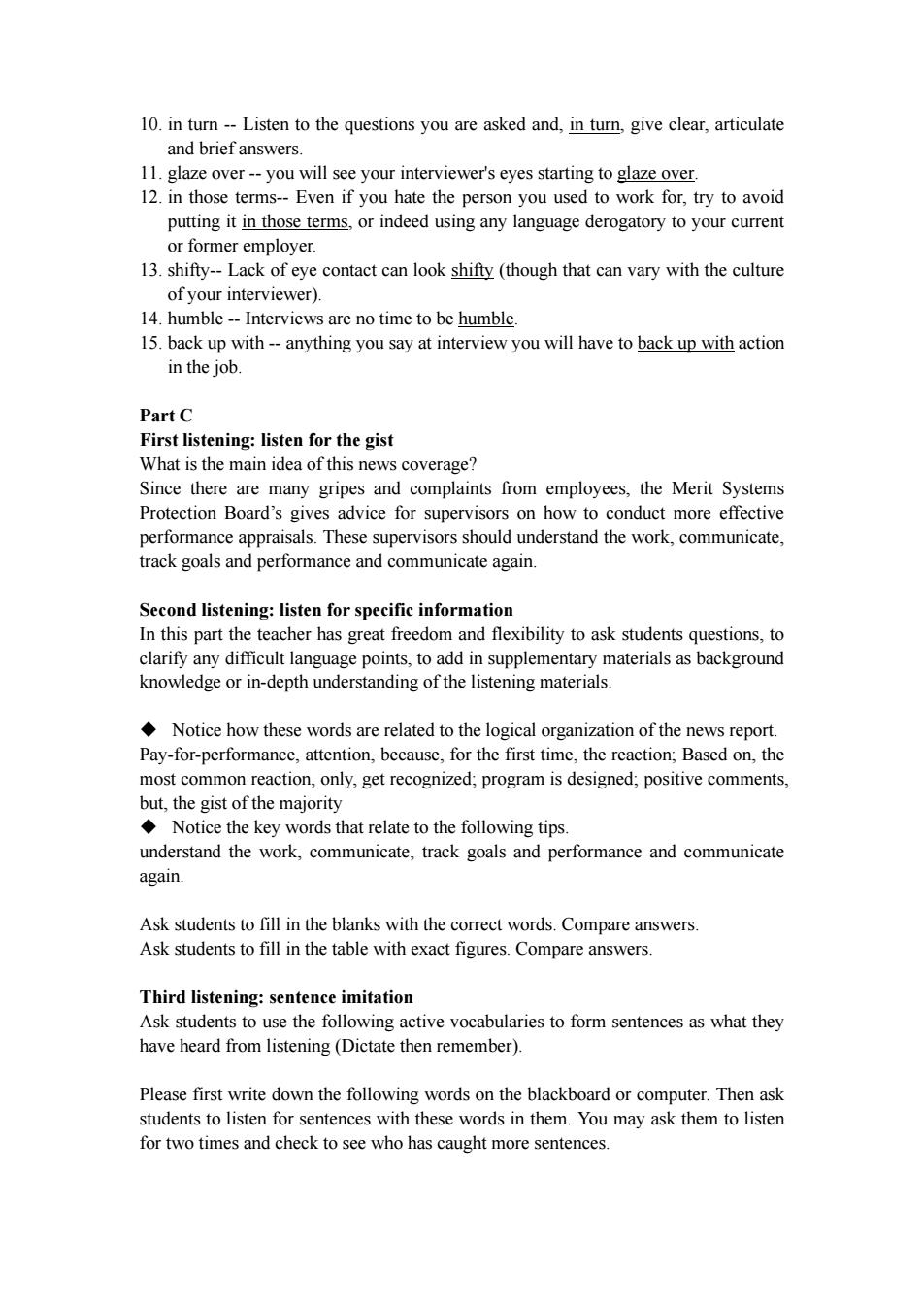正在加载图片...

10.in turn--Listen to the questions you are asked and,in turn,give clear,articulate and brief answers. 11.glaze over--you will see your interviewer's eyes starting to glaze over. 12.in those terms--Even if you hate the person you used to work for,try to avoid putting it in those terms,or indeed using any language derogatory to your current or former employer. 13.shifty--Lack of eye contact can look shifty (though that can vary with the culture of your interviewer). 14.humble--Interviews are no time to be humble. 15.back up with--anything you say at interview you will have to back up with action in the job. Part C First listening:listen for the gist What is the main idea of this news coverage? Since there are many gripes and complaints from employees,the Merit Systems Protection Board's gives advice for supervisors on how to conduct more effective performance appraisals.These supervisors should understand the work,communicate, track goals and performance and communicate again. Second listening:listen for specific information In this part the teacher has great freedom and flexibility to ask students questions,to clarify any difficult language points,to add in supplementary materials as background knowledge or in-depth understanding of the listening materials Notice how these words are related to the logical organization of the news report. Pay-for-performance,attention,because,for the first time,the reaction;Based on,the most common reaction,only,get recognized;program is designed;positive comments, but,the gist of the majority Notice the key words that relate to the following tips. understand the work,communicate,track goals and performance and communicate again. Ask students to fill in the blanks with the correct words.Compare answers. Ask students to fill in the table with exact figures.Compare answers. Third listening:sentence imitation Ask students to use the following active vocabularies to form sentences as what they have heard from listening(Dictate then remember). Please first write down the following words on the blackboard or computer.Then ask students to listen for sentences with these words in them.You may ask them to listen for two times and check to see who has caught more sentences.10. in turn -- Listen to the questions you are asked and, in turn, give clear, articulate and brief answers. 11. glaze over -- you will see your interviewer's eyes starting to glaze over. 12. in those terms-- Even if you hate the person you used to work for, try to avoid putting it in those terms, or indeed using any language derogatory to your current or former employer. 13. shifty-- Lack of eye contact can look shifty (though that can vary with the culture of your interviewer). 14. humble -- Interviews are no time to be humble. 15. back up with -- anything you say at interview you will have to back up with action in the job. Part C First listening: listen for the gist What is the main idea of this news coverage? Since there are many gripes and complaints from employees, the Merit Systems Protection Board’s gives advice for supervisors on how to conduct more effective performance appraisals. These supervisors should understand the work, communicate, track goals and performance and communicate again. Second listening: listen for specific information In this part the teacher has great freedom and flexibility to ask students questions, to clarify any difficult language points, to add in supplementary materials as background knowledge or in-depth understanding of the listening materials. Notice how these words are related to the logical organization of the news report. Pay-for-performance, attention, because, for the first time, the reaction; Based on, the most common reaction, only, get recognized; program is designed; positive comments, but, the gist of the majority Notice the key words that relate to the following tips. understand the work, communicate, track goals and performance and communicate again. Ask students to fill in the blanks with the correct words. Compare answers. Ask students to fill in the table with exact figures. Compare answers. Third listening: sentence imitation Ask students to use the following active vocabularies to form sentences as what they have heard from listening (Dictate then remember). Please first write down the following words on the blackboard or computer. Then ask students to listen for sentences with these words in them. You may ask them to listen for two times and check to see who has caught more sentences